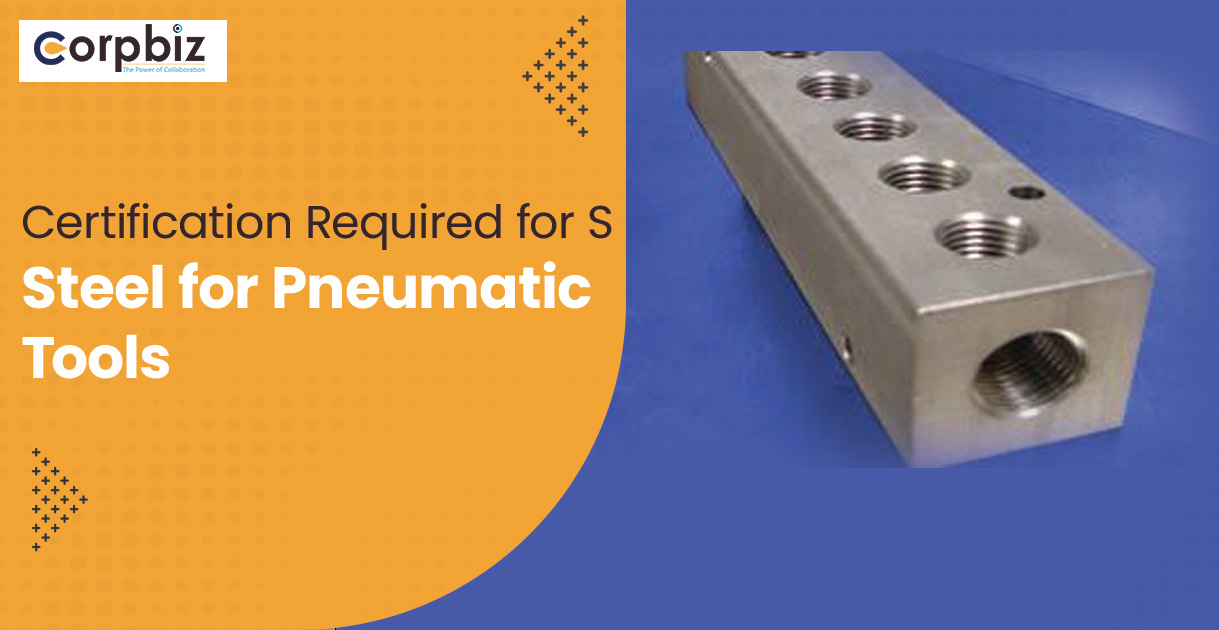Steel is a class of iron-based alloys with only a small amount of carbon. It is probably the most applied material in every industry. Its strength and multiple uses make it crucial for construction works, from large infrastructures to simple consumer goods. One such application includes steel for pneumatic tools, which demand that steels with special properties be developed to exist under high-impact or repetitive stress conditions.
Pneumatic tools such as air hammers, impact wrenches, and drills are in huge demand in automobile repair, construction, and manufacturing industries. Steel quality plays a major role in building such tools. Therefore, based on quality, safety, and performance assurance, the Bureau of Indian Standards has mandated certification under IS 5651:1987 for steel used in pneumatic tools. This blog will discuss the certification, requirements, and the manufacturer-consumer implications.
Overview of IS 5651:1987 Standard
Specifically, IS 5651:1987 covers the requirements for alloy steel manufacturing pneumatic tools. This standard specifies physical requirements, including chemical composition, mechanical properties, and steel manufacturing processes. This standard for steel for pneumatic tools ensures that the steel retains all the required properties to work with total reliability in demanding applications.
Key Tests and Specifications for Steel for Pneumatic Tools
Certain critical tests that should be carried out to ensure the quality of steel used in pneumatic tools, as per IS 5651:1987, have been stipulated. The following are a few tests and specifications for steel for pneumatic tools:
1. Chemical Composition
To attain the required property, ensure the right mix of constituents/element balance.
2. Hardness
The resistance of the steel to deformation is tested.
3. Macrostructure and Microstructure
The internal structure is checked for defects or irregularities.
4. Surface Decarburization
The loss of carbon at the surface is checked for, which can weaken the steel.
5. Grain Size
It refers to the size of the grains in the steel, which influences the strength and toughness.
6. Non-metallic inclusions
Determine the non-metallic particles that may lower the capability performance of the steel.
7. Dimensional tolerance
It ensures that the steel dimensions Stay within the acceptable limits based on its application.
Government Regulations and Quality Control Orders (QCOs)
The Ministry of Steel, Government of India, has issued quality control orders from time to time to ensure the quality of steel products, including Pneumatic Tools. The government ordered a QCO dated 5 February 2024 for steels used in Pneumatic Tools under the standard IS 5651:1987.
The QCO shall make it mandatory for every domestic or foreign manufacturer to have its steel products BIS-certified before they can be marketed, imported, or exported within India.
Role of Certification in Industry Standards and Best Practice
BIS certification for Steel for Pneumatic Tools is crucial in ensuring that industry standards and best practices are consistently met, fostering trust and credibility. It also helps organizations demonstrate compliance, enhancing their competitive edge and market reputation.
1. Enhance product Reliability and Performance
The rigorous standards set by the BIS ensure that only the finest steel is used in pneumatic tool manufacturing. This emphasis on quality makes pneumatic tools more reliable and better performing, reduces equipment failure rates, and ascertains proper tool functioning even under stern conditions.
2. Supporting Entrepreneurship, Innovation, and Technological Advancement
Setting these high standards for BIS certification is believed to boost innovation further and improve the quality of the products manufacturers offer. It would also open up the development of new steel alloys and a new manufacturing process, providing better performance characteristics, namely, higher strength, toughness, wear, and corrosion resistance.
3. Fostering Competition Within the Market Environment
It makes mandatory certification under the BIS a level playing field in which these stringent requirements are applied rigorously to all companies. It ideally creates a springboard for healthy competition: the greater the proficiency and attractiveness of the products, the higher the possibility of winning over the chosen customer segment.
Certification Process for Steel for Pneumatic Tools
The manufacturers of steel for Pneumatic Tools are required to make an application for BIS certification. Once they submit all the detailed documents concerning the product specifications, manufacturing, and quality control measures, the certification process is facilitated by assuring compliance with the standards specified by BIS.
· Application Form V
It must be a filled application form with correct details of the manufacturer and its product.
· Business License
A copy of a valid business registration certificate or license.
· Product Specifications
Steel for Pneumatic Tools shall be described and specified in detail, including the raw materials and manufacturing processes.
· Quality Control Documents
The measures of quality control that have been implemented, such as quality manuals, process flow charts, and inspection procedures.
· Test Reports
The laboratory test reports from BIS-accredited labs reflect compliance with Indian standards.
· Factory Layout
This is the layout of the production factory, pointing out sections that will be concerned with producing the steel for Pneumatic Tools.
· Process Flow Chart
An elaborate flow chart showing the entire manufacturing procedure, right from the procurement of raw materials to the inspection of the finished product.
· Calibration Certificates
Equipment calibration certificates are used in manufacturing for testing and measurement.
· Sample Products
Samples of the Steel for Pneumatic Tools for physical inspection and testing by BIS officers.
· Audit Reports
Earlier audit reports (if any) showing compliance with BIS standards.
· Employee Details
Information regarding the key personnel involved in the respective production and quality control departments.
· Declaration Forms
Declarations related to the product’s safety, conformance to standards and use of hazardous material.
Challenges and Possible Implications for Manufacturers
Manufacturers often face challenges in meeting stringent industry standards, which can lead to increased production costs and delays. Failing to comply with these standards may result in legal consequences and damage to the reputation. Below are some of the challenges and possible implications for manufacturers:
· Navigating the Certification Process
The process of BIS certification is a maze for most manufacturers, especially the smaller players and new entrants to the Indian market. The stiff requirements in the documentation, testing, and inspection seem daunting, so it takes a relatively long time to complete the process.
· Costs and Resource Allocation
It may strongly be felt that the cost of certification procedures, including testing and related inspections, requires a significant investment to enable adaptation to the prescribed production methods, which require manufacturers to adequately allocate sufficient resources for this kind of compliance, which sometimes needs strategic planning and budgeting.
· Staying updated with Regulatory Changes
The regulatory environment for BIS certification may change, ranging from standards and compliance to testing procedures; manufacturers need to be updated on such changes to remain compliant and continue business operations without interruption.
Effect on Consumer Safety and Confidence
The BIS certification is concerned with key roles associated with the safety and quality appraisal of materials used in pneumatic tools. It admits compliance with the standardized IS 5651:1987, operating to reduce the risk by avoiding failures that may result in accidents or injuries at an industry setup.
This safety assurance thus safeguards workers and enhances consumer confidence in the products they buy. ISI Mark certification helps consumers build trust in some pneumatic tools, they can be assured that such tools are tested and approved to carry high standards of safety in applications characterized by high stress and impact. This heightened confidence could reflect increased brand loyalty towards certified products.
Conclusion
The BIS certification under IS 5651:1987 assures that the quality of Steel Wire for Pneumatic Tools in India meets set norms, harnesses safety in use, and meets regulatory requirements. Apart from assuring the product’s reliability in the consumers’ minds, it also provides a competitive edge to the manufacturers in the market because their products are made according to national standards.
While the certification procedures are, without doubt, tough, it is necessary for maintaining the high standards of industries; if an aspiring manufacturer can successfully pass this certification process, it will be able to derive long-term benefits that can be attributed to minimized product return, improved market reputation, and compliance with the legal requirements.
Ensure your steel for pneumatic tools meets the highest standards with BIS certification under IS 5651:1987, visit our website corpbiz to navigate the certification process and secure your market position.
Frequently Asked Question
Why BIS Certification is important for steel for pneumatic tools?
This certification implies that the concerned products meet the standards set by BIS for steels used for pneumatic tools. BIS certification under IS 5651:1987 is important to ensure that steels will have what it takes to be reliable and safe during high-impact applications.
Mainly, this is regarding the required properties like hardness and toughness to prevent the failure of the tools in any way. It helps industrial setups to ensure both safety and durability.What does IS 5651:1987 cover?
IS 5651:1987 provides requirements for alloy tool steels used to manufacture pneumatic tools. It forms the basic criteria for chemical composition, mechanical properties, and manufacturing processes to ensure the steel is suitable for highly stressed and highly abrasive applications, which are normally typical for pneumatic tools.
Is BIS certification mandatory for all manufacturers of steel used in pneumatic tools?
Yes, all domestic or foreign manufacturers of steel for pneumatic tools intended for sale in India must get a certificate from BIS. Without this certification, such products cannot be legally offered for sale, imported, or exported into the Indian market.
What major tests involve the BIS certification of steels intended for pneumatic tools?
The BIS certification tests for steels used by pneumatic tools include chemical composition, hardness, macro-structure, micro-structure, surface decarburization, grain size, non-metallic inclusions, and dimensional tolerances. These will assure the steel of a desired quality and performance standard.
How does BIS certification impact consumer safety and confidence?
Testing for BIS certification means that the products pass severe safety and quality standards, reducing the chance of tool failure that leads to accidents. Consumers looking at an ISI Mark on pneumatic tools will be surety aware that such tools have gone through rigorous tests and approval, thus making them feel more confident about the reliability and safety of a product.
What happens to those manufacturers who do not get BIS-certified products?
Manufacturers not acquiring BIS are not allowed to sell, market, import, or export respective products within India. Violations under the BIS would then mean penalties in terms of fines, product withdrawal, or bans on selling the products, which would impact the manufacturer’s access to the market and reputation.
Read Our Article: Certification Required for Manufacturers of Monocrotophos










